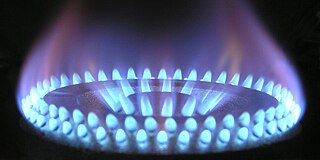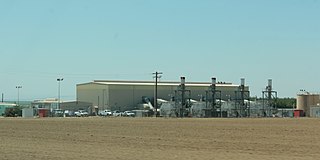Northern Natural Gas (NNG) is a natural gas pipeline which brings gas from the Permian Basin in Texas to the Chicago area, Wisconsin, Minnesota and the Upper Peninsula of Michigan. It is owned by MidAmerican Energy Holdings Company. Its FERC code is 59.

Natural gas is a naturally occurring mixture of gaseous hydrocarbons consisting primarily of methane (97%) in addition to various smaller amounts of other higher alkanes. Low levels of trace gases like carbon dioxide, nitrogen, hydrogen sulfide, and helium are also usually present. Methane is colorless and odorless, and the second largest greenhouse gas contributor to global climate change after carbon dioxide. Because natural gas is odorless, odorizers such as mercaptan are commonly added to it for safety so that leaks can be readily detected.

A pipeline is a system of pipes for long-distance transportation of a liquid or gas, typically to a market area for consumption. The latest data from 2014 gives a total of slightly less than 2,175,000 miles (3,500,000 km) of pipeline in 120 countries around the world. The United States had 65%, Russia had 8%, and Canada had 3%, thus 76% of all pipeline were in these three countries.

The Turkmenistan–Afghanistan–Pakistan–India (TAPI) Gas Pipeline, also known as Trans-Afghanistan Pipeline, is a natural gas pipeline being developed by the Galkynysh – TAPI Pipeline Company Limited with participation of the Asian Development Bank. The pipeline will transport natural gas from the Galkynysh Gas Field in Turkmenistan through Afghanistan into Pakistan and then to India. Construction on the project started in Turkmenistan on 13 December 2015, while construction of the Afghanistan-Pakistan section of the pipeline was held in February 2018. Proponents of the project see it as a modern continuation of the Silk Road.
Enbridge Inc. is a Canadian multinational pipeline and energy company headquartered in Calgary, Alberta, Canada. Enbridge owns and operates pipelines throughout Canada and the United States, transporting crude oil, natural gas, and natural gas liquids, and also generates renewable energy. Enbridge's pipeline system is the longest in North America and the largest oil export pipeline network in the world. Its crude oil system consists of 28,661 kilometres of pipelines. Its 38,300 kilometre natural gas pipeline system connects multiple Canadian provinces, several US states, and the Gulf of Mexico. The company was formed by Imperial Oil in 1949 as the Interprovincial Pipe Line Company Limited to transport Alberta oil to refineries. Over time, it has grown through acquisition of other existing pipeline companies and the expansion of their projects.

TC Energy Corporation is a major North American energy company, based in the TC Energy Tower building in Calgary, Alberta, Canada, that develops and operates energy infrastructure in Canada, the United States, and Mexico. The company operates three core businesses: Natural Gas Pipelines, Liquids Pipelines and Energy.

Atmos Energy Corporation, headquartered in Dallas, Texas, is one of the United States' largest natural-gas-only distributors, serving about three million natural gas distribution customers in over 1,400 communities in nine states from the Blue Ridge Mountains in the East to the Rocky Mountains in the West.

El Paso Corporation was a provider of natural gas and related energy products and was one of North America's largest natural gas producers until its acquisition by Kinder Morgan in 2012. It was headquartered in Houston, Texas, United States.
Phoenix Natural Gas is the largest gas distribution business in Northern Ireland, being the owner and operator of the licence for the distribution network in the Greater Belfast area. The distribution business is responsible for the development of the pipeline network and also for providing a 24/7 operational and transportation service platform to suppliers under the rules of the company's network code. The ongoing investment within the Phoenix Natural Gas licence area does not attract any grant or support from local or UK government. The investment is a standalone private venture.
Nord Stream is a pair of offshore natural gas pipelines in Europe that run under the Baltic Sea from Russia to Germany. It comprises the Nord Stream 1 (NS1) pipeline running from Vyborg in northwestern Russia, near Finland, and the Nord Stream 2 (NS2) pipeline running from Ust-Luga in northwestern Russia near Estonia. Both pipelines run to Lubmin in the northeastern German state of Mecklenburg-Vorpommern. Each pipeline comprises two pipes, denoted A and B; each of the four pipes is approximately 1,200 kilometres (750 mi) long and with approximate diameters of 1,220 millimetres (48 in). The combined capacity of the four pipes is 110 billion cubic metres per annum of natural gas.

Kinder Morgan, Inc. is one of the largest energy infrastructure companies in North America. The company specializes in owning and controlling oil and gas pipelines and terminals.

Natural gas prices, as with other commodity prices, are mainly driven by supply and demand fundamentals. However, natural gas prices may also be linked to the price of crude oil and petroleum products, especially in continental Europe. Natural gas prices in the US had historically followed oil prices, but in the recent years, it has decoupled from oil and is now trending somewhat with coal prices.

The oil and gas industry is usually divided into three major components: upstream, midstream and downstream. The midstream sector involves the transportation, storage, and wholesale marketing of crude or refined petroleum products. Pipelines and other transport systems can be used to move crude oil from production sites to refineries and deliver the various refined products to downstream distributors. Natural gas pipeline networks aggregate gas from natural gas purification plants and deliver it to downstream customers, such as local utilities.

GAIL (India) Limited is a central public sector undertaking. It has the following business segments: natural gas, liquified natural gas, liquid hydrocarbon, liquefied petroleum gas transmission, petrochemicals, city gas distribution, renewable energy including solar & wind, exploration and production, GAILTEL and electricity generation. GAIL was given the Maharatna status on the 1 February 2013 by the Indian Government, a status which 11 other Public Sector Undertakings (PSUs) have.

Snam S.p.A. is an Italian energy infrastructure company.

A compressor station is a facility which helps the transportation process of natural gas from one location to another. Natural gas, while being transported through a gas pipeline, needs to be periodically pressurized at intervals of 40 to 100 miles. Siting is dependent on terrain, and the number of gas wells in the vicinity. Frequent elevation changes and a greater number of gas wells will require more compressor stations.
The United Kingdom's National Transmission System (NTS) is the network of gas pipelines that supply gas to about forty power stations and large industrial users from natural gas terminals situated on the coast, and to gas distribution companies that supply commercial and domestic users. It covers Great Britain, i.e. England, Wales and Scotland.

Russia supplies a significant volume of fossil fuels to other European countries. In 2021, it was the largest exporter of oil and natural gas to the European Union, (90%) and 40% of gas consumed in the EU came from Russia.

The Trans-Anatolian Natural Gas Pipeline is a natural gas pipeline in Turkey. It is the central part of the Southern Gas Corridor, which connects the giant Shah Deniz gas field in Azerbaijan to Europe through the South Caucasus Pipeline and the Trans Adriatic Pipeline. The pipeline has a strategic importance for both Azerbaijan and Turkey. It allows the first Azerbaijani gas exports to Europe, beyond Turkey. It also strengthens the role of Turkey as a regional energy hub.

Nord Stream is a network of offshore natural gas pipelines which run under the Baltic Sea from Russia to Germany to provide Western Europe with natural gas. It comprises two separate projects, Nord Stream 1 and Nord Stream 2. Both pipelines each comprise two pipes, NS1 A and B as well as NS2 A and B, for a total of 4 physical pipes. Both pipelines start in Russia and land in Lubmin, Germany. They are majority owned by Russia, along with German, Dutch and French stakeholders. They were financed by a consortium of companies from Russia, Germany, France, Austria and the Netherlands. It was the first pipeline that bypassed Ukraine and Poland to deliver Russian natural gas directly to West Europe.